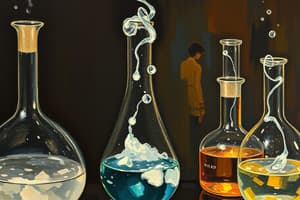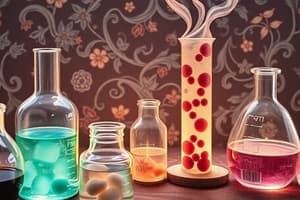Podcast
Questions and Answers
Which of the following compounds has the highest percentage of ionic character?
Which of the following compounds has the highest percentage of ionic character?
- Nonpolar covalent compound
- Covalent compound
- Polar covalent compound
- Ionic compound (correct)
Which type of bond has the highest percentage of ionic character?
Which type of bond has the highest percentage of ionic character?
- Double bond
- Triple bond
- Polar covalent bond
- Ionic bond (correct)
Which of the following elements is most likely to form a compound with the highest percentage of ionic character?
Which of the following elements is most likely to form a compound with the highest percentage of ionic character?
- Sodium (correct)
- Chlorine
- Fluorine
- Oxygen
What is the difference between qualitative and quantitative analysis in analytical chemistry?
What is the difference between qualitative and quantitative analysis in analytical chemistry?
What are the four major steps involved in a complete quantitative determination?
What are the four major steps involved in a complete quantitative determination?
What does the chapter in the text mainly cover?
What does the chapter in the text mainly cover?
Where do students practice the separation techniques mentioned in the chapter?
Where do students practice the separation techniques mentioned in the chapter?
What is the purpose of the theoretical treatment in this chapter?
What is the purpose of the theoretical treatment in this chapter?
Flashcards are hidden until you start studying




